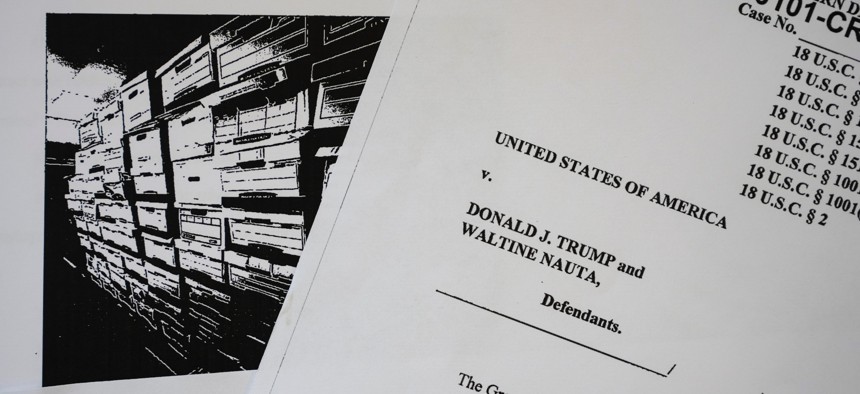
Rep. Mikie Sherrill's, D-N.J., bill is in response to former President Donald Trump's indictment for allegedly mishandling classified documents. Drew Angerer / Getty Images
Bill would axe classified access for feds charged with a crime
Legislation sponsored by Rep. Mikie Sherrill, D-N.J., appears tailored to allegations of Donald Trump's retention of classified documents, but would remove almost any federal employee’s access if they were charged with specific offenses.
A new bill seemingly crafted to address allegations that former President Donald Trump mishandled classified information would remove the security access of any federal employee and candidate running for federal office if charged with certain crimes.
The Guarding the United States Against Reckless Disclosures Act — sponsored by Rep. Mikie Sherrill, D-N.J., — would restrict classified access of an individual charged or convicted of obstructing an official proceeding, unlawful retention of national defense information, the unlawful disclosure or improper handling of classified information, acting as a foreign agent or compromising the national security of the United States.
Those covered crimes are among several the former president has been charged with as a result of his alleged retention of classified documents and the subsequent 2022 FBI raid of his home at Mar-a-Lago.
Trump is currently awaiting federal trial over his handling of classified documents following a 38-felony charge indictment in 2023.
“In public service there’s nothing more important than upholding the oath of office and protecting our national security,” said Sherrill, in a statement. “That’s why I’m extremely concerned about recent charges against Donald Trump and his continued desire to access sensitive classified information, despite reckless actions and serious criminal charges.”
While citing Trump as a catalyst, the GUARD Act extends its authority to the president, vice president, members of Congress, candidates for federal office and all federal employees defined under the U.S. code, including members of the U.S. Postal Service, Postal Regulatory Commission, the Transportation Security Administration, uniformed personnel and others.
Classified access would be removed from the date on which an indictment is filed until either the charge has been dismissed or the person has been found not guilty.
While the bill’s enforcement could easily be applied in cases like the alleged Discord leak mastermind Jack Teixeira, but how the national security apparatus might operate if the president and vice president were hypothetically under indictment, is less clear. Officials from Sherrill’s office weren’t immediately available for comment.
“Nobody is entitled or legally obligated to classified briefings – certainly not Trump, even if he is the Republican nominee for president,” said Sherrill. “This legislation is urgent and should be considered by both parties as a necessary step to protect intelligence and ensure sensitive information doesn’t get into the wrong hands.”
The GUARD Act has been referred to the House Committee on Oversight and Accountability and the Committee on House Administration.







